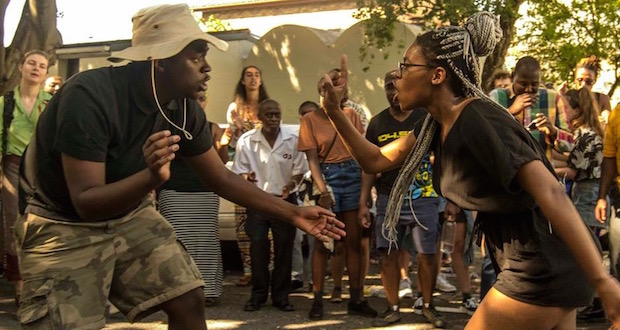The Fees Commission has been in session this week but the purpose of the commission is being questioned by students. Students feel the score so far is:
Free education: Dololo
Bureaucratic agenda: 1
The Fees Commission was set up by President Jacob Zuma in response to student protests against the rising cost of tuition. Yet the commission’s purpose from the beginning was only to assess the “feasibility†of free education.
For students, however, the question was never whether #FreeEducation is possible, but rather, in what guise a system of free education should be implemented and what exactly the path towards realising it is.
“My feeling is that often these commissions just get set up so that things happen on paper to excuse the institution and kind of derail movements,†said Kyla Jade, a student journalist from South African History Online.
It’s absolutely ridiculous that the #FeesCommission is doing this now & throwing around Feasibility on the eve of a new fee increase
— Brian Kamanzi (@BrianIKamanzi) August 10, 2016
Commissions are historically seen as means of sidelining issues
There are however several concerns relating to the legitimacy of South African commissions in general. Vusi Mahlangu, a #FeesMustFall activist, points out that our track record of such commissions does not bode well.
“It’s said that whenever there is some crisis, they implement a commission. We have at least two commissions that are notorious in this country. The TRC – which left victims crying and perpetrators running around – and the Marikana Commission – which too left victims crying and let perpetrators free,†he said.
Mahlangu’s sentiments are not isolated. Much of the #FeesCommission debate featured students, activists and the general public expressing deep skepticism of the processes unfolding before them.
“Commission” is becoming buzzword for govt when there is no political will but also public pressure #FeesCommission https://t.co/HkzjpwXGOE
— Uyanda Mabece (@UyandaMabece) August 10, 2016
Dololo representation of students
As progressive academics have argued , the official Ministerial Task Team – set up parallel to the Fees Commission to advise Nzimande on a way forward – is made up entirely of economists. This further raises questions about the legitimacy of the commission, as this task team is advising Blade prior to findings from the commission being put forward.
It also leads us to the question of how those who are directly affected by fees not included in the decision-making process that determines it?
“I think we need to be very skeptical of who’s in this commission and task team. We are the experts on what it is to be a student – to some big official we’re just a statistic. But it actually affects us on a personal level. We are the ones who are living with the constraints set about by inaccessibility,†said Rheumle Biagini, a 1st year student at Wits University.
Fears surrounding student debt
In the first sitting of the Fees Commission, Wits Vice Chancellor Adam Habib, along with his panel of academics presented their “Hybrid Model†which proposed more options for school leavers away from university. According to their presentation, reservations about student loans to fund educations are unfounded. In Habib’s view, university education is not meant for everyone – yet the issue was never about whether all should attend, but rather whether the option remains accessible to all those who choose to.
The possibility of crippling student debt must, however, be given due consideration as the reality of “debt slavery†that many US students currently face, could prove disastrous here. Many students who do not have economic privilege will have further costs weighing over them after graduation. These costs of having to pay back loans impact their social mobility and thus add to the entrenchment of systemic inequality.
In a country such as ours where unemployment continues to cripple development, it seems academics – like Habib – are once more willing disregard the voices of students in order to protect the economic status quo.
“[Student debt] is something that is geared off of global capitalism, which is born in a sort of western framework and doesn’t lend itself to the particular needs of a country such as SA,†said Phumlani Pikoli, an activist and journalist.
Academics and students question who would bear the brunt of student debt, saying that it would mostly disenfranchise those from rural backgrounds, the majority of our black working class and our most vulnerable communities. All of this, of course, further perpetuates South Africa’s legacy of historic inequality and structural violence.
The collective voice of youth towards the #FeesCommission and Blade’s Ministerial Task team might be best summarised thus:
So. Are still pretending that this #FeesCommission is going to be fruitful?
— Beyoncé Pad Thai* (@PearlPillay) August 10, 2016









